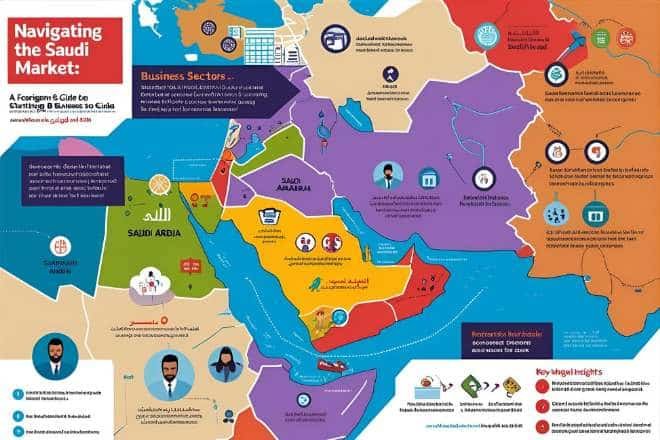Thinking of starting a business in Saudi Arabia as a foreigner? It’s possible—and a lot of people are doing it. But it’s not plug-and-play. There are rules, paperwork, and cultural stuff you need to understand first.
The good news? The country wants foreign investors. It’s part of Vision 2030. They’re opening doors, cutting red tape, and pushing for more businesses in sectors like tech, tourism, logistics, entertainment, and more.
But if you walk in blind, you’ll waste time and money. So here’s how it really works—from licenses to partnerships to local habits that can make or break your setup.
1. Can a Foreigner Own a Business in Saudi Arabia?
Yes. You don’t have to be a Saudi to run a business here. The government now allows 100% foreign ownership in many industries.
Here’s the catch: you’ll need a few things:
- A foreign investor license from the Ministry of Investment (MISA)
- A commercial registration (CR) – this is your legal business ID
- A local address (you can’t register with a P.O. Box)
- A solid business plan if you’re applying as a new investor
Some sectors (like retail or professional services) may still require a local partner, especially if your capital is under a certain amount. So always check based on what you plan to do.
2. Investor Visa or Work Visa?
If you’re the owner or founder, apply for an Investor Visa. It’s better than a regular job visa. It allows you to:
- Stay long-term
- Manage your business legally
- Sponsor dependents
- Bring in employees
You’ll get this visa after setting up your company and getting your MISA license.
3. Start with the Right Setup
There are a few business types to choose from:
- LLC (Limited Liability Company) – Most common for small to medium businesses
- Sole Proprietorship – Easier, but not ideal for foreigners
- Branch of a foreign company – For companies already operating abroad
- Joint ventures – If you have a local partner
Suppose you don’t know which one’s best, talk to a legal consultant or PRO. They’ll save you days of paperwork and possible rejection.
4. You Need a Local Bank Account
This step takes patience. Banks are strict, and opening a business account as a foreigner means you’ll need:
- Valid CR
- National Address
- Your license
- Passport and visa copies
- Sometimes, a physical office lease
Some banks are better than others. Al Rajhi and SABB are common picks, but ask other expats or business owners which ones move faster.
5. Understand the Local Culture — Or Struggle
Saudi Arabia isn’t like the West, and that’s not a bad thing. But if you ignore the local way of doing things, you’ll hit walls.
Here’s what matters:
- Respect comes first. Titles, greetings, and tone matter. Don’t jump straight to business.
- Timing is flexible. Meetings often start late. You need patience, especially during Ramadan or public holidays.
- Business is personal. Saudis like to build trust before doing deals. Don’t rush things.
- Separate gender spaces exist. Some offices, cafes, and work environments may have gender-specific sections.
If you’re not sure about something, just ask respectfully. Locals usually appreciate the effort.

6. Avoid These Common Mistakes
A lot of foreigners fail in KSA for reasons that have nothing to do with their idea. Here are some traps to skip:
- Relying only on agents. Some agents promise they’ll “handle everything,” but disappear halfway. Always ask for official receipts and updates.
- Not registering properly. If you’re running a business from home or renting a shop unofficially, you risk fines—or worse.
- Ignoring Saudization. The government wants companies to hire Saudis. Depending on your size and sector, you’ll have to meet certain quotas.
- Thinking it’s cheap. Some things are low-cost here—like electricity or fuel—but setup fees, government costs, and office rent can add up fast.
Be prepared. Not paranoid, just ready.
7. What’s the Real Cost to Start?
It depends on your sector, business type, and if you’re going solo or with partners. Here’s a rough breakdown:
- MISA foreign investor license: SAR 2,000 – SAR 62,000/year
- Commercial registration (CR): SAR 800 – SAR 1,200/year
- Chamber of Commerce membership: SAR 2,000 – SAR 10,000
- Local office rent: SAR 2,000+ per month (depends on city)
- Legal help or PRO services: SAR 5,000 – SAR 15,000 (one-time or per setup)
So yeah—it’s not “cheap,” but it’s not impossible either. Plan at least SAR 20K–30K to get started if you’re going legal.
8. Use Local Incubators and Support Hubs
The Saudi ecosystem has changed. It’s not all red tape anymore. You’ll find help if you know where to look:
- Monshaat: Government support for small businesses.
- The Space: Coworking + events in Riyadh, Tabuk, and more.
- Vibes: Jeddah-based hub for creative and tech startups.
- Wa’ed (Aramco): Startup funding and business acceleration.
- Riyadh Chamber & Jeddah Chamber: Networking, licensing help, and workshops.
You don’t have to figure everything out alone. There are free sessions, local mentors, and real resources.
9. Launching Your Business: Take It Step by Step
Once you’ve got your CR, investor license, office, and bank account, don’t rush into things. Start slow. Focus on the setup that actually works.
Here’s how most smart founders begin:
- Start with one service or product — test what works before expanding
- Hire minimal staff — don’t burn money on a big team too soon
- Use WhatsApp, Instagram, or Twitter to market — it’s where people pay attention
- Join local business groups — most cities have WhatsApp or Telegram groups for founders
- Track everything — invoices, receipts, expenses, and government renewals
Stay lean. Adjust fast. And don’t assume your audience thinks like you — watch what they care about.
10. Getting Customers in Saudi Arabia
In KSA, trust matters more than ads. If someone knows you or sees others vouching for you, they’ll try you. So, focus on:
- Word of mouth — overdeliver early on
- Social proof — post feedback, reviews, screenshots
- Local platforms — register your business on Haraj, OpenSooq, and Google Maps
- Arabic content — even simple Arabic posts or captions help you reach more people
- Partnering with locals — find someone inside your niche or industry who already has reach
You don’t need a huge marketing budget. You need to be real, visible, and consistent.
11. Staying Out of Trouble
The system is improving, but don’t mess with regulations. The rules are strict when it comes to:
- Unlicensed activity
- Visa violations
- Tax evasion (ZATCA will check you)
- Hiring without contracts or iqamas
- Failing to renew CR or commercial licenses on time
If you stay organized and follow the rules, you’ll be fine. Just don’t assume things are “chill” here — always double-check before acting.
Final Advice: You Can Do This — But Don’t Fake It
Saudi Arabia is full of opportunity, but it’s not a shortcut country. You can’t fake a business here. It has to work. It has to serve a real need. And it has to follow the law.
But if you bring something real, keep things clear, and respect how the system works, you’ve got a shot.
People are doing it every day.
Start small. Don’t wait forever. Ask for help when you need it.
And always keep your paperwork clean.
FAQs
Can foreigners start a business in Saudi Arabia?
Yes. With the right license and documents, foreigners can legally own and run businesses in many sectors.
What documents do I need to register a company in KSA?
You’ll need a foreign investor license (MISA), CR, local address, and valid ID documents.
Is 100% foreign ownership allowed in Saudi Arabia?
Yes, for many sectors. Some still require a Saudi partner, depending on your business type and capital.
How much does it cost to set up a business as a foreigner?
Expect SAR 20K–30K or more for licenses, office rent, legal help, and bank setup.
What are the best cities in KSA for starting a business?
Riyadh, Jeddah, and Dammam are top picks with good infrastructure and startup support.


